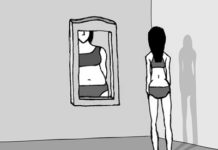Starvation: What Does it Do to the Brain?
The Minnesota Starvation Experiment was conducted at the University of Minnesota during the Second World War. Prolonged semi-starvation produced significant increases in depression, hysteria and hypochondriasis, and most participants experienced periods of severe emotional distress and depression and grew increasingly irritable. It really should not be a surprise to this audience that the brain’s functioning is highly compromised when the body is being starved of food (and nutrients). What we wonder is whether eating a diet of primarily highly processed foods low in nutrients has similar effects.
Dehumanization Linked to Poorer Mental and Physical Health
A new review finds that dehumanizing language, including self-dehumanization, is connected to anxiety, depression, and disordered eating.
From Self-Harm to Self-Empowerment: Liberation Through Words
In contemporary U.S. culture, people who intentionally hurt their bodies are called “insane.” We may starve ourselves or carve ourselves, taking to the extreme culturally-embedded norms like thinness in an effort to fight against marginalization or cope with internalized shame. But instead of obtaining the voice or place in society we yearn for, we are further ostracized.
United Nations Report Calls for Revolution in Mental Health Care
In a new report, the United Nations Special Rapporteur on the right to health, Dr. Dainius Pūras, calls for a move away from the biomedical model and “excessive use of psychotropic medicines.”
Your Weight is Forbidden Fruit
In inpatient eating disorders care, we were required to step on the scale but were not allowed to know what we weighed. We were told it was “against recovery” to know our weight; that knowing it would surely cause a devastating relapse.
Eat Breathe Thrive: Chelsea Roff on Eating Disorders, Trauma, and Healing with Yoga and...
Chelsea Roff is the Founder and Director of Eat Breathe Thrive (EBT), a non-profit with an inspired mission to bring yoga, mindfulness, and community support to people struggling with negative body image and disordered eating. I reached out to Chelsea to learn more about her life and organization, which she writes, “…is like AA for people with food and body image issues, plus yoga and meditation.” Chelsea shared her journey from life as a patient to yogi, author, and innovative community organizer. With her permission, you can find this interview below.
Is Binge Eating Disorder Just Another Made-Up Disease?
If a person binges habitually, upon sensing certain stimuli the pancreas prepares the body with insulin, and simultaneously, the stomach prepares by getting more acidic. This means that for many of us, the drive to binge is a physical need. Therapy blames the patient for “bad coping” when all she is doing is responding to her body's signals.
Childhood Emotional Abuse Associated with Internal Eating Disorder Voice
Many individuals diagnosed with eating disorders describe and internal ‘voice,’ which may be linked to experiences of childhood trauma and dissociation.
Are Eating Disorder Centers a “Rehab Racket”?
-She won a seminal court case requiring insurance companies to pay for stays in residential treatment centers for eating disorders, and now Jeanene Harlick has begun an investigative expose on those same centers' poor practices.
What About Fat Voices? Our Experience With Fat Invisibility
In this piece for Resilient Fat Goddess, psychologist and fat activist Rachel Millner critiques the pervasiveness of fatphobia, sizeism, and weight bias within the eating...
Why We Fell for Clean Eating
From The Guardian: Not only is the clean eating movement based on pseudoscientific beliefs not backed up by evidence, but it may also lead to...
The Therapist who Saved my Life
In this creative nonfiction piece for Literary Hub, one woman shares her story of trauma, depression, and suicidality, and recounts the unconventional approach of the...
Time on a Therapist’s Couch Yields Personality Changes
From Ars Technica: A recent meta-analysis found that a variety of different therapeutic techniques result in positive personality changes. The two personality traits most impacted...
To the Bone: The Trouble With Anorexia on Film
From The Atlantic: The new Netflix film To the Bone, which tells the story of a woman's struggle with anorexia, reflects our culture's morbid fascination and...
“I Cried Every Day at Work”: Mental Health Among Doctors
From The Guardian: Doctors are increasingly experiencing mental health issues due to the unrelenting pressure, inhumane working hours, brutal competition, and workplace bullying that is...
The Strange, Contagious History of Bulimia
In this piece for Science of Us, Lee Daniel Kravetz discusses the impact of media exposure on the rise of bulimia and explores the social...
In a Traumatised World, is Psychedelic Therapy our Best Hope?
From VolteFace Magazine: MDMA-assisted psychotherapy can play a major role in helping people heal from the effects of trauma.
"The results really are incredible and I’ve had...
Psychiatrist Who Revolutionized Family Therapy Dies at 96
From The Washington Post: Salvador Minuchin, the psychiatrist who played an instrumental role in pioneering family therapy, died on October 30th at age 96. Minuchin was...
Virtual Reality Promising for Mental Health Treatment
From Healio: A recent review indicated that virtual reality-based treatment may be effective for a variety of mental health concerns including phobias, social anxiety, PTSD,...
‘Breastaurants’ Are Hurting Employees’ Mental Health
From HuffPost Canada: New research suggests that working at restaurants that sell sexual objectification of female staff, such as Hooters, can have a negative impact...
Rethinking Anxiety
In this interview with Jackie Dent, President of Clear Spot Club, social work lecturer Emma Tseris explains how labelling someone with an anxiety disorder fails...


























